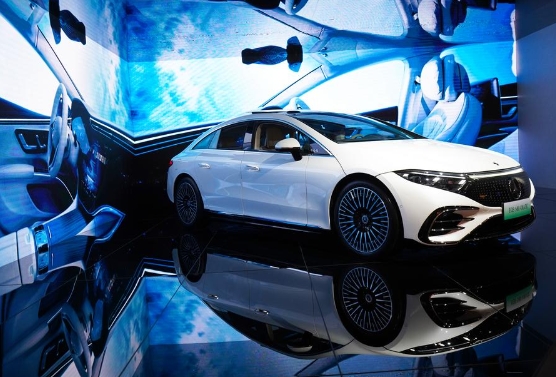Mercedes-Benz chief sees market potential, long-term opportunities in China

This photo taken on Nov. 6, 2022 shows a new energy vehicle of German automaker Mercedes-Benz at the automobile exhibition area of the fifth China International Import Expo (CIIE) at the National Exhibition and Convention Center (Shanghai) in east China's Shanghai. (Xinhua/Jin Haoyuan)
Mercedes-Benz board chairman Ola Kaellenius disclosed that the company has increased the size of its R&D team in China over the past few years. Describing the innovations in China's auto industry as "vibrant," Kaellenius said: "We want to participate in that vibrant, innovative landscape."
The reason why Germany's leading luxury automaker Mercedes-Benz continues to invest in China is that the company believes in China and sees long-term opportunities, the company's top executive has said.
Ola Kaellenius, chairman of the board of management of Mercedes-Benz, told Xinhua in a recent interview that he saw great potential in the Chinese auto market, the biggest in the world.
Kaellenius believes that "there's definite growth potential" in China in the long term as car ownership rate in China still lags other mature markets in the world.
China, which is also the biggest and "hugely important" market for the German automaker, enjoys Kaellenius's close attention. "So I'm never out of China, even if I'm not physically in China."
The company is poised to bring into China's auto market a total of 15 new models, signaling intensifying efforts by the luxury automaker to consolidate its presence in the increasingly competitive auto market.
On March 1, Mercedes-Benz introduced four new versions of its new E-class model with lengthened wheelbases in China. Kaellenius pins high hopes on the new E class, which is one of the bestselling models of the company.
As part of what appears to be a two-pronged strategy in China, the German automaker plans to offer more new models, including both battery electric vehicles and "electrified high-tech combustion" vehicles, by the end of this decade.
Kaellenius disclosed that the company has increased the size of its R&D team in China over the past few years. Describing the innovations in China's auto industry as "vibrant," Kaellenius said: "We want to participate in that vibrant, innovative landscape."
The two R&D centers in Beijing and Shanghai enable the company to develop a wide array of new technologies for both the Chinese market and other markets in the world. "They are fully integrated in our global R&D effort."
Regarding the EU's probe into the so-called subsidy on Chinese vehicles, Kaellenius said "we should not get into the situation where trade barriers being raised in any directions."
It is "natural and normal" for auto companies to enter foreign markets given that the Chinese auto industry is "fully developed" and at "eye level" with any other auto industry, said Kaellenius.
Kaellenius attributes the economic and wealth growth over the last few decades in China to market opening-up, which has created "an investment friendly sentiment" and facilitated the Chinese to go out into the world.
"If we go back in the other direction and start (to) increase protectionism, I fear that the result will be slower growth," among other consequences.
Kaellenius called for clear rules of engagement and a level playing field for all market participants. He suggested that policymakers look at the opportunities "win-win and growing economic ties would actually lead to."
Editor:伏娅敏
